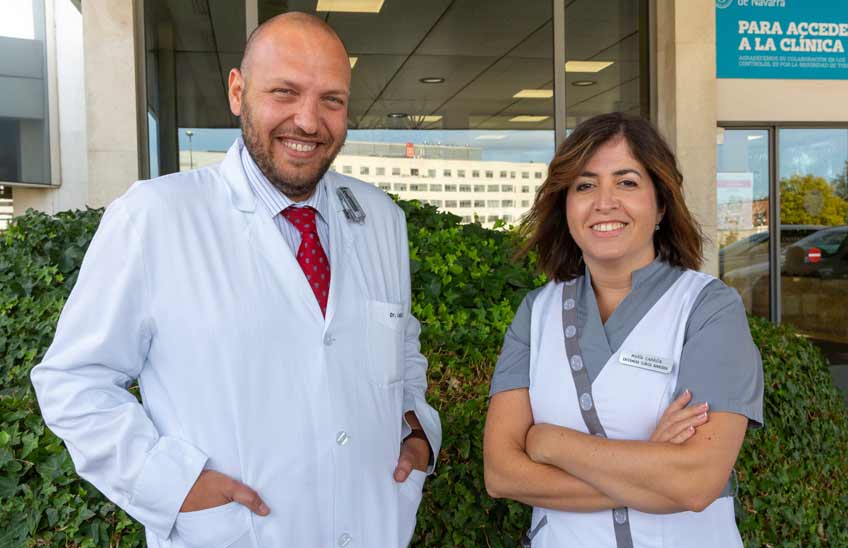"The most common chronic pain is back pain, which affects 13% of the population in Spain".
Dr. Nicolás Varela and María Carrión, Advanced internship nurse at the area del Dolor at Clínica Universidad de Navarra, give a free webinar on pain.

PhotoManuelCastells/Dr Nicolás Varela and María Carrión
13 | 10 | 2021
In the framework of the programme of training Continua of the School of Nursing of the University of Navarra, the nurse of internship Advanced , María Carrión and Dr. Nicolás Varela, manager of the area of the Pain of the University of Navarra, have given the webinar "The Nursing in front of the pain". Clínica Universidad de NavarraThe webinar "Nursing in the face of pain", in which they addressed, before more than 200 professionals, the relevance of a problem that affects around 20% of the population and which, in the case of the most prevalent, back pain, is suffered by 5.5 million people in Spain.
The activity - free of charge and especially aimed at nursing professionals who want to continue their training to keep up to date in their respective fields of work- is the first of a series of continuous training actions launched by School in the 21-22 academic year.
As Dr Varela explains, pain is "basically whatever the patient says is pain. If the patient says they are in pain, you have to believe them". "However," he specifies, "there is a lot of social ignorance about what this concept means, even though it is a constant in the lives of all human beings - we all feel pain from time to time - it can also be a pathology in itself". In fact, the most common chronic pains include musculoskeletal pain, "in particular, back pain, due to the progressive wear and tear of the joints of the lumbar spine; as well as chronic postoperative pain and oncological pain - which is treated at department in Palliative Care", Dr. Varela explains.
The "Pain Management Programme
It is also a very complex pathology. "That is why we in nursing approach pain with a holistic approach , which allows us to analyse it in the full complexity of the person, taking into account not only the physical damage caused by the pain, but also many other aspects that make us experience something as more or less painful, such as previous experiences of pain, the interpretation staff or cultural interpretation of pain, the state of mind, perceived social support, etc.", stresses María Carrión.
One of the most complex aspects of dealing with this problem is that people "bring different expectations about what they expect health professionals to do for their pain and tend to believe that we can relieve it, but this is not possible in all cases. There are some pains that cannot be relieved satisfactorily. However, you can always try to learn to live with that pain and lead a full life," stresses the expert, Master's Degree at internship Advanced from Johns Hopkins University.
This is the goal, precisely, of the so-called "Pain management programmes", in which they work individually with each patient to provide them with tools "to improve their daily lives, with the help of physiotherapists, psychologists, doctors, nurses and other professionals, putting the patient and their family at the centre", concludes the trainer of the webinar.
